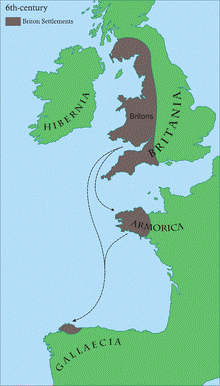
Great Britain in the second half of the 5th Century CE -
between the Roman withdrawal and the founding of Anglo-Saxon kingdoms.
Britons (historical)

Great Britain in the second half of the 5th Century CE -
between the Roman withdrawal and the founding of Anglo-Saxon kingdoms.
The Britons (sometimes Brythons or British) were the Celtic people culturally dominating Great Britain from the Iron Age through the Early Middle Ages. They spoke the Insular Celtic language known as British or Brythonic. They lived throughout Britain south of about the Firth of Forth; after the 5th century Britons also migrated to continental Europe, where they established the settlements of Brittany in France and the obscure Britonia in what is now Galicia, Spain.
The earliest evidence for the Britons and their language in historical sources dates to the Iron Age. By the 11th century their descendants had split into distinct groups, and are generally discussed separately as the Welsh, Cornish, Bretons, and the people of the Hen Ogledd ("Old North"). The British language developed into the distinct branches of Welsh, Cornish, Breton, and Cumbric.
Territory

Britons migrated westwards during the Anglo-Saxon invasion
Throughout their existence, the territory inhabited by the Britons was composed of numerous ever-changing areas controlled by tribes. The extent of their territory before and during the Roman period is unclear, but is generally believed to include the whole of the island of Great Britain, as far north as the Clyde-Forth isthmus. The territory north of this was largely inhabited by the Picts, although a portion of it was eventually absorbed into the Gaelic kingdom of Dál Riata. The Isle of Man was originally inhabited by Britons also, but eventually it became Gaelic territory. Meanwhile, Ireland is generally believed to have been entirely Gaelic throughout this period.
In 43 the Roman Empire invaded Britain. The British tribes initially opposed the Roman legions, but by 84 the Romans had decisively conquered southern Britain and had pushed into what is now southern Scotland. In 122 they fortified the northern border with Hadrian's Wall, which spanned what is now Northern England. In 142 Roman forces pushed north again and began construction of the Antonine Wall, which ran between the Forth-Clyde isthmus, but they retreated back to Hadrian's Wall after only 20 years. Although the native Britons mostly kept their land, they were subject to the Roman governors. The Roman Empire retained control of "Britannia" until its departure about AD 430.
Around the time of the Roman departure, the Germanic-speaking Anglo-Saxons began a migration to the Eastern coast of Britain, where they established their own kingdoms. Eventually, the Brythonic language in these areas was replaced by that of the Anglo-Saxons. At the same time, some Britons established themselves in what is now called Brittany. There they set up their own small kingdoms and the Breton language developed there from Insular Celtic rather than Gaulish. They also retained control of Cornwall and Northwest England, where Kingdoms such as Dumnonia and Rheged survived.
By the end of the 1st millennium, the Anglo-Saxons and Gaels had conquered most of the British territory in Britain, and the language and culture of the native Britons had largely been extinguished, remaining only in Wales, Cornwall, parts of Cumbria and Eastern Galloway.